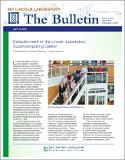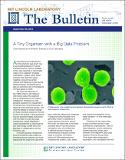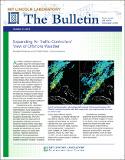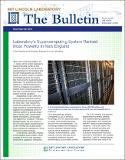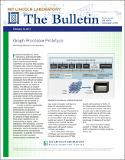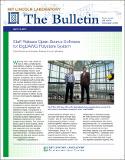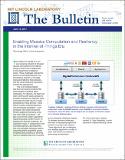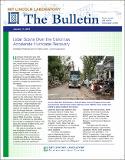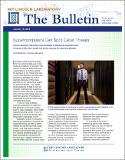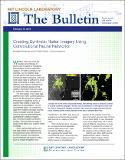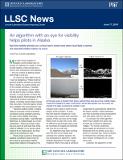Browsing LLSC in the News by Issue Date
Now showing items 1-20 of 83
-
MIT SuperCloud
(MIT Lincoln Laboratory, 2015-05-08)The “big data” problem is pervasive across the DoD and is most commonly characterized by the three “Vs” of big data: volume, velocity, and variety. Now, increasingly, a fourth “V”, veracity (i.e., security), is becoming ... -
Establishment of the Lincoln Laboratory Supercomputing Center
(MIT Lincoln Laboratory, 2016-04-15)Lincoln Laboratory has been a world leader in interactive supercomputing since the 1950s. Recently, the Laboratory acknowledged the importance of the LLGrid world-class computing capability with the establishment of the ... -
A Tiny Organism with a Big Data Problem
(MIT Lincoln Laboratory, 2016-09-09)Prochlorococcus is the smallest and most abundant photosynthetic organism on earth. Despite its tiny size, it’s an organism of global importance. In recent decades, researchers have sequenced the organisms’ genomes. Advances ... -
Expanding Air Traffic Controllers’ View of Offshore Weather
(MIT Lincoln Laboratory, 2016-10-14)Researchers at the Laboratory, working with the Federal Aviation Administration, have designed the Offshore Precipitation Capability (OPC) to address the lack of airspace situational awareness for aircraft traversing oceanic ... -
Laboratory’s Supercomputing System Ranked Most Powerful in New England
(MIT Lincoln Laboratory, 2016-12-02)The new computing system, TX-Green, at the Lincoln Laboratory Supercomputing Center (LLSC) has been named the most powerful supercomputer in New England and the 3rd most powerful at a United States university on the TOP500 ... -
Capitalizing on Machine Learning - from Life Sciences to Financial Services
(HPCwire, 2016-12-26)The promise of machine learning has a science fiction flavor to it: computer programs that learn from their experiences and get better and better at what they do. So is machine learning fact or fiction? The global marketplace ... -
Supercharging Big Data Research with New England’s Fastest Supercomputer
(ISTC Big Data, 2017-01-11)ISTC for Big Data caught up with ISTC for Big Data Principal Investigator and Lincoln Laboratory fellow Dr. Jeremy Kepner, who heads the LLSC, to learn more about Lincoln Laboratory's new supercomputer, how it’s helping ... -
MIT Lincoln Laboratory Takes the Mystery Out of Supercomputing
(insideHPC, 2017-01-18)In this special guest feature, Dr. Jeremy Kepner from MIT Lincoln Laboratory describes the lab’s approach to developing algorithms that will keep their users productive as new processing technologies evolve. -
Graph Processor Prototype
(MIT Lincoln Laboratory, 2017-02-10)In order to achieve significantly better graph computation performance, an advanced multiprocessor architecture has been developed that is optimized for analysis of large databases. -
Staff Release Open Source Software for BigDAWG Polystore System
(MIT Lincoln Laboratory, 2017-04-14) -
Enabling Massive Computation and Resiliency in the Internet-of-Things Era
(MIT Lincoln Laboratory, 2017-06-16)The Internet of Things (IoT), an ever-growing network of physical devices connected to the Internet, brings a unique set of challenges to the Department of Defense (DoD). These challenges include the billions of connected ... -
DataSToRM: Data Science and Technology Research Environment
(MIT Lincoln Laboratory, 2018-02-09)By analyzing graphs using specialized algorithms, complex relationships and deeper insight can be extracted from the raw information. In the last several years, the Laboratory has developed the Graph Processor, which has ... -
Winds Forecast Rapid Prototype
(MIT Lincoln Laboratory, 2018-06-08)Wind causes significant problems for aviation, yet the Federal Aviation Administration has limited tools for forecasting its impact. MIT Lincoln Laboratory is developing technology to generate improved wind forecasts through ... -
New Textbook Applies Mathematics to the Management of Big Data
(MIT Lincoln Laboratory, 2018-08-10)Mathematics of Big Data is the first book to present the common mathematical foundations of big data analysis across a range of applications and technologies. -
Lidar Scans Over the Carolinas Accelerate Hurricane Recovery
(MIT Lincoln Laboratory, 2019-01-11)The Federal Emergency Management Agency (FEMA) called upon MIT Lincoln Laboratory to use its state-of-the-art light detection and ranging (lidar) system to image the destruction from hurricane Florence. A high-resolution ... -
Supercomputers Can Spot Cyber Threats
(MIT Lincoln Laboratory, 2019-01-18)Lincoln Laboratory researchers have developed a technique to compress hours of internet traffic into a bundle that can be analyzed for suspicious behavior. -
Creating Synthetic Radar Imagery Using Convolutional Neural Networks
(MIT Lincoln Laboratory, 2019-02-15)Weather radar can track the location and intensity of storms and is useful for managing transportation around hazardous weather. Air traffic controllers, for example, rely on weather radar to track storms that could impact ... -
MIT Lincoln Lab Offers Advice for Delivering On-Demand HPC
(HPCwire, 2019-03-11)Looking for advice on how to deliver HPC to a diverse science user community? MIT’s Lincoln Laboratory has just posted a new paper – Lessons Learned from a Decade of Providing Interactive, On-Demand High Performance Computing ... -
Wilkinson Prize goes to developers of flexible Julia programming language
(MIT Lincoln Laboratory, 2019-03-12)Programmers developing applications for fields as diverse as astronomy, economics, artificial intelligence, energy optimization, and medicine often found themselves creating software with languages that offered slow ... -
An algorithm with an eye for visibility helps pilots in Alaska
(MIT Lincoln Laboratory, 2019-06-17)In remote areas of Alaska, pilots check current or forecasted weather conditions before they fly, but a lack of automated weather observation stations throughout the Alaskan bush makes it hard to know exactly what to expect. ...


